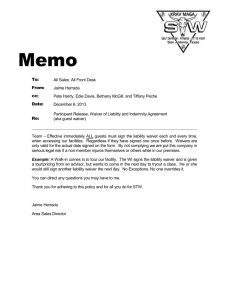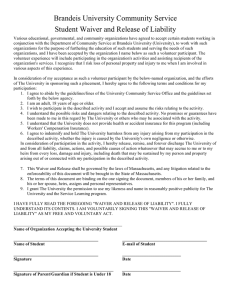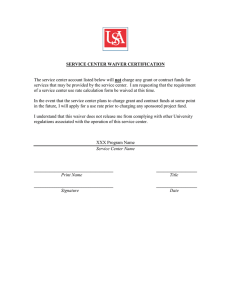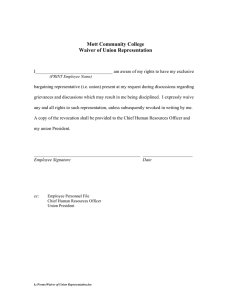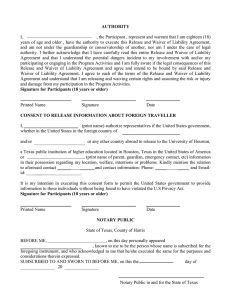August 29, 2012 Dear City Attorney:
advertisement
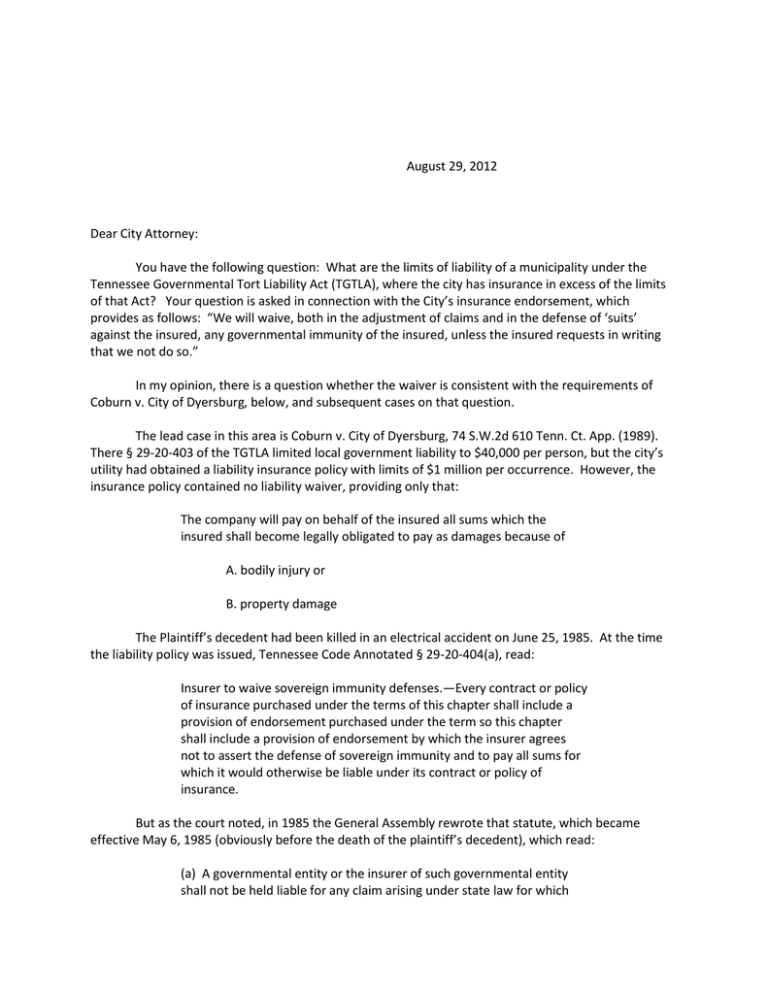
August 29, 2012 Dear City Attorney: You have the following question: What are the limits of liability of a municipality under the Tennessee Governmental Tort Liability Act (TGTLA), where the city has insurance in excess of the limits of that Act? Your question is asked in connection with the City’s insurance endorsement, which provides as follows: “We will waive, both in the adjustment of claims and in the defense of ‘suits’ against the insured, any governmental immunity of the insured, unless the insured requests in writing that we not do so.” In my opinion, there is a question whether the waiver is consistent with the requirements of Coburn v. City of Dyersburg, below, and subsequent cases on that question. The lead case in this area is Coburn v. City of Dyersburg, 74 S.W.2d 610 Tenn. Ct. App. (1989). There § 29-20-403 of the TGTLA limited local government liability to $40,000 per person, but the city’s utility had obtained a liability insurance policy with limits of $1 million per occurrence. However, the insurance policy contained no liability waiver, providing only that: The company will pay on behalf of the insured all sums which the insured shall become legally obligated to pay as damages because of A. bodily injury or B. property damage The Plaintiff’s decedent had been killed in an electrical accident on June 25, 1985. At the time the liability policy was issued, Tennessee Code Annotated § 29-20-404(a), read: Insurer to waive sovereign immunity defenses.—Every contract or policy of insurance purchased under the terms of this chapter shall include a provision of endorsement purchased under the term so this chapter shall include a provision of endorsement by which the insurer agrees not to assert the defense of sovereign immunity and to pay all sums for which it would otherwise be liable under its contract or policy of insurance. But as the court noted, in 1985 the General Assembly rewrote that statute, which became effective May 6, 1985 (obviously before the death of the plaintiff’s decedent), which read: (a) A governmental entity or the insurer of such governmental entity shall not be held liable for any claim arising under state law for which the governmental entity has immunity under this chapter unless the governmental entity has expressly waived such immunity. A governmental entity or the insurer of such governmental entity shall not be held liable for any judgment in excess of the limits of liability set in § 29-20-403, unless the governmental entity has expressly waived such limits. The waiver of such immunity or such limits of liability by a governmental entity shall only be valid if such waiver is expressly contained in the provisions or endorsement of a policy or contract of insurance authorized by this chapter to cover its liability under this chapter. [At 611] [Emphasis is the courts] The court concluded that subsection (b) of that statute allowed a governmental entity to obtain insurance against federal liabilities in any amount it deemed proper, but repeated that “such policy or contract of insurance shall not be construed to deem a waiver of any immunity provided in this chapter or of the limits liability set forth in § 29-20-403 of any claims arising under state law. [At 611] [Emphasis added by the court.] The result of that case was that because there was no waiver of liability in the liability insurance policy the city’s utility was not liable for any of the plaintiff’s decedent’s claim above the $40,000 limit in § 29-20-403 of the TGTLA. It appears to me that an argument can be made that the waiver of liability in the City’s endorsement is not effective against the city. The endorsement arguably does not reflect an “express waiver of immunity by the government”, rather a waiver of defenses of immunity by the insurance carrier, “unless the insured requests in writing that we not do so.” The second place that an express waiver of immunity is required in § 29-20-404(a) says that, “The waiver of such immunity or such limits of liability by a governmental entity shall only be valid if such waiver is expressly contained in the provisions of the endorsement of a policy or contract of insurance authorized by this chapter to cover its liability under this chapter.” Again the endorsement in the city’s liability policy reflects a waiver by the insurance company of defenses it can assert, but no waiver of immunity or limits on liability by the city. You may want to check with your insurance carrier to assure yourself that the waiver reflects an express waiver by the city. Crutcher v. Maury County Board of Education, 2008 WL 2695660 (Tenn. Ct. App.) (Appeal denied Feb. 17, 2009), citing City of Dyersburg and two other subsequent cases, appears to support the conclusion that the City’s endorsement may be inadequate: …[W]e agree with the trial court that in order to recover for any amount in excess of the limits in Tenn. Code Ann. § 29-20-403, the waiver of limits of liability must be “expressly contained” in the insurance policy as required by Tenn. Code Ann. § 29-20-404(a). This conclusion has been reached in three other court of appeals decisions. See Coburn v. City of Dyersburg, 774 S.W.2d 610, 611 (Tenn. Ct. App. 1989); Goff v. Howell, 01A01-9401-CV-00024, 1994 WLK 317542, at 3-4 (Tenn. Ct. App. July 6, 1994) (“As we read [Tenn. Code Ann. § 29-10-404(a)] that waiver requires two things: an express waiver of the liability limits by the county and the inclusion of that waiver in an insurance policy covering the increased exposure. One of the two is not sufficient.”); Cline v. City of Chattanooga, CA No. 976, 1991 WL 25941, at 3 (Tenn. Ct. App. March 4, 1991) (perm app. Denied August 5, 1991 (“absent an express provision in the liability policy as required by [Tenn. Code Ann. §29-20-404(a)], the limits Tenn. Code Ann. § 29-20-403 must be applied.”) We also note that permission to appeal to the Tennessee Supreme Court was denied in Coburn and Cline. [At 5] [My emphasis] Crutcher v. Maury County Board of Education indicates that the waiver in that case was required to be a waiver of liability by the county and an inclusion of that waiver in the liability policy. Finally, in a case peripherally related to your question, see Black v. City of Memphis, 2009 WL 2461816 (Tenn. Ct. App.). There the plaintiff argued that the city “should be deemed to have constructively waived its right to protection under the GTLA’s statutory damage cap by engaging in conduct that unnecessarily prolonged the case and drove up her costs. In support of her argument she cites Section 29-20-2014, which allows a governmental entity to expressly waive the GTLA’s liability limits.” The court replied that “The statute specifically requires an express waiver before a governmental entity can be held liable for damages in excess of the statutory cap. Ms. Black cites no authority to support her argument that a governmental entity can be deemed to constructively waive its protection under the GTLA damage cap….” [At 5] Sincerely, Sidney D. Hemsley Legal Consultant
